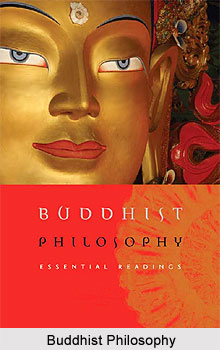 Svasamvedana is a term from Buddhist logic that refers to reflexive or self cognition. All cognitions and feelings are directly aware of them or reveal them to the subject. If cognitions were not perceived, perception of objects would be impossible.
Svasamvedana is a term from Buddhist logic that refers to reflexive or self cognition. All cognitions and feelings are directly aware of them or reveal them to the subject. If cognitions were not perceived, perception of objects would be impossible.
Pleasures and pains are not types of awareness, although they may become the objects of awareness. They do distinguish between the causal conditions giving rise to an experience and the subjective awareness of experience or what one feels. Self-awareness sometimes means that one is not just aware of what one experiences, but also of the self as the subject of experience. The self is not known as the subject in the manner in which external objects are identified.
This article is a stub. You can enrich by adding more information to it. Send your Write Up to content@indianetzone.com



















